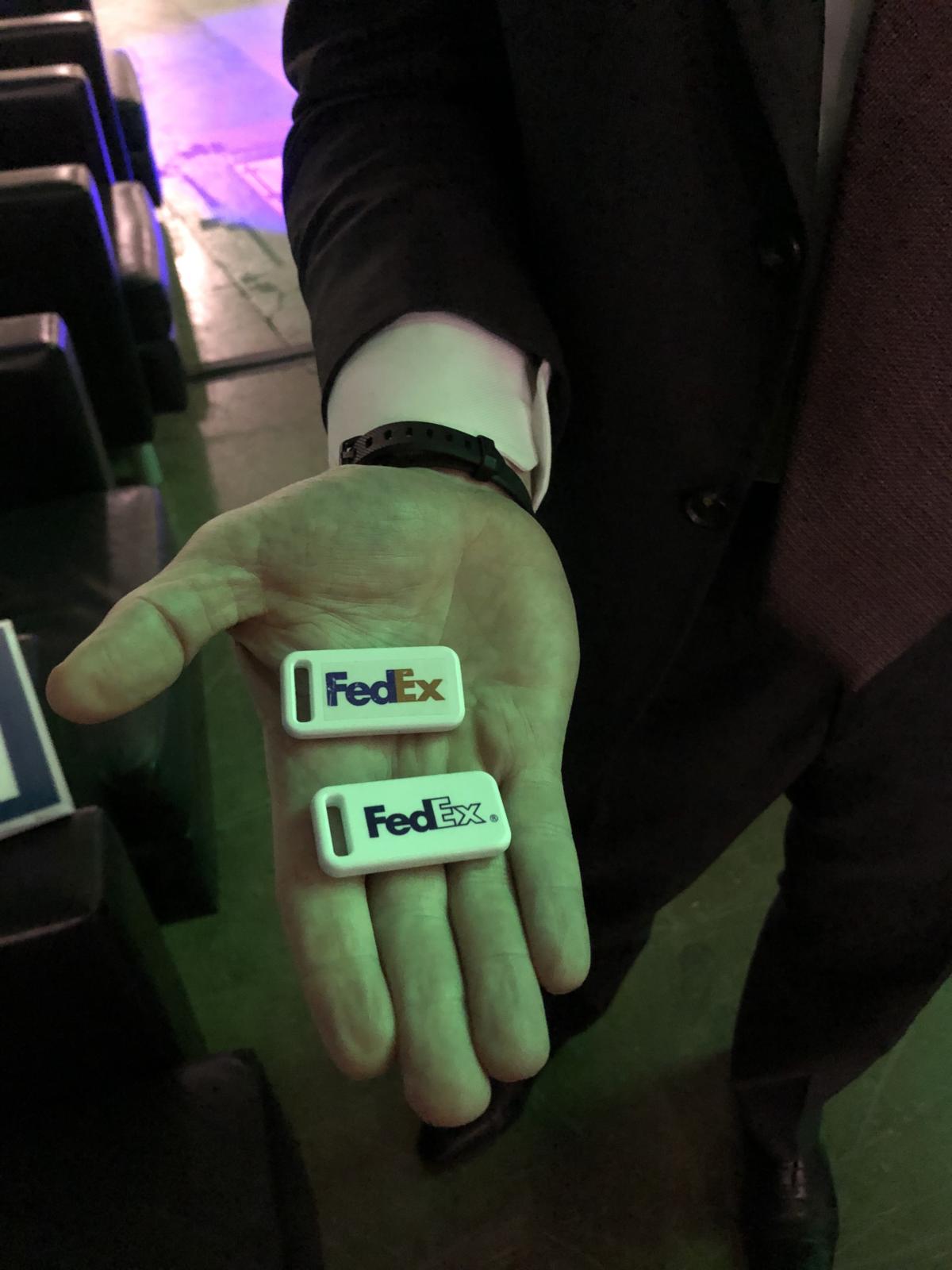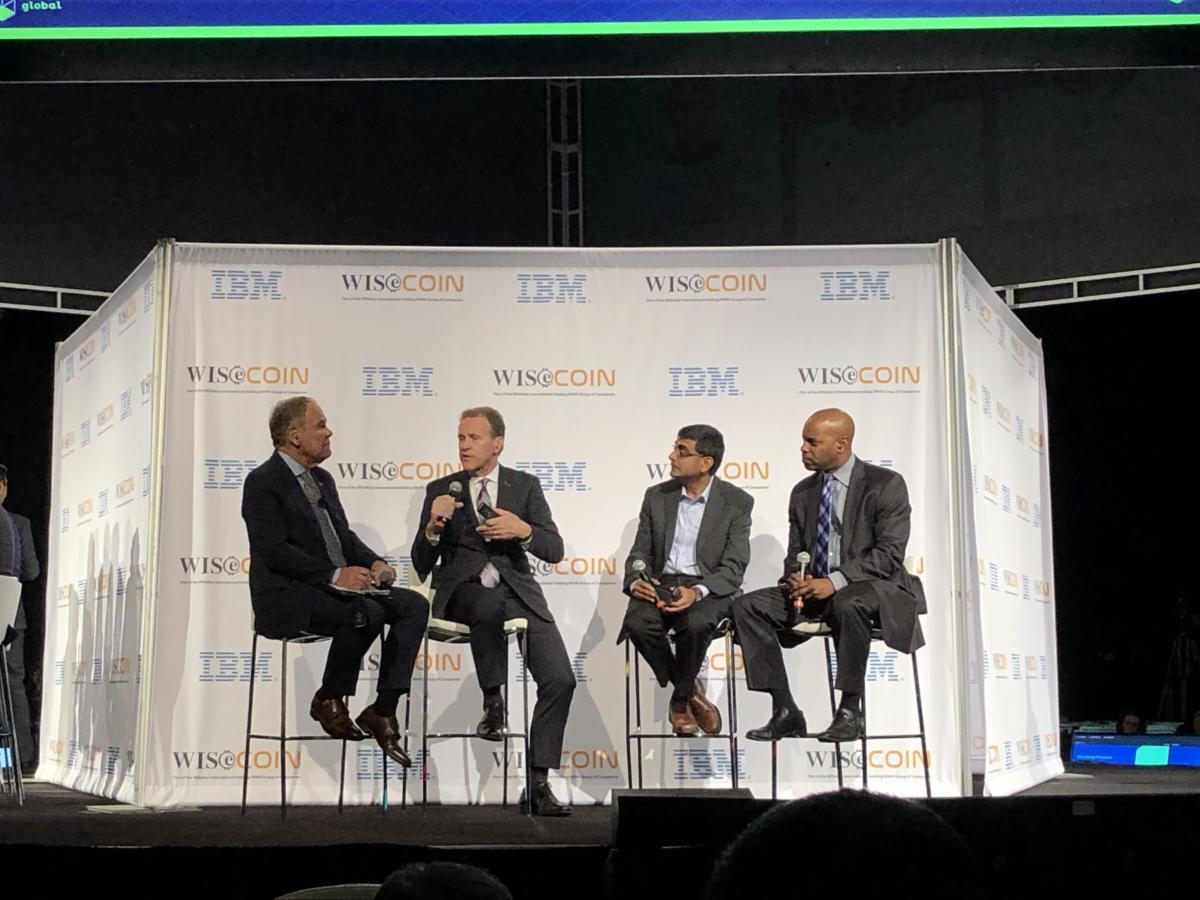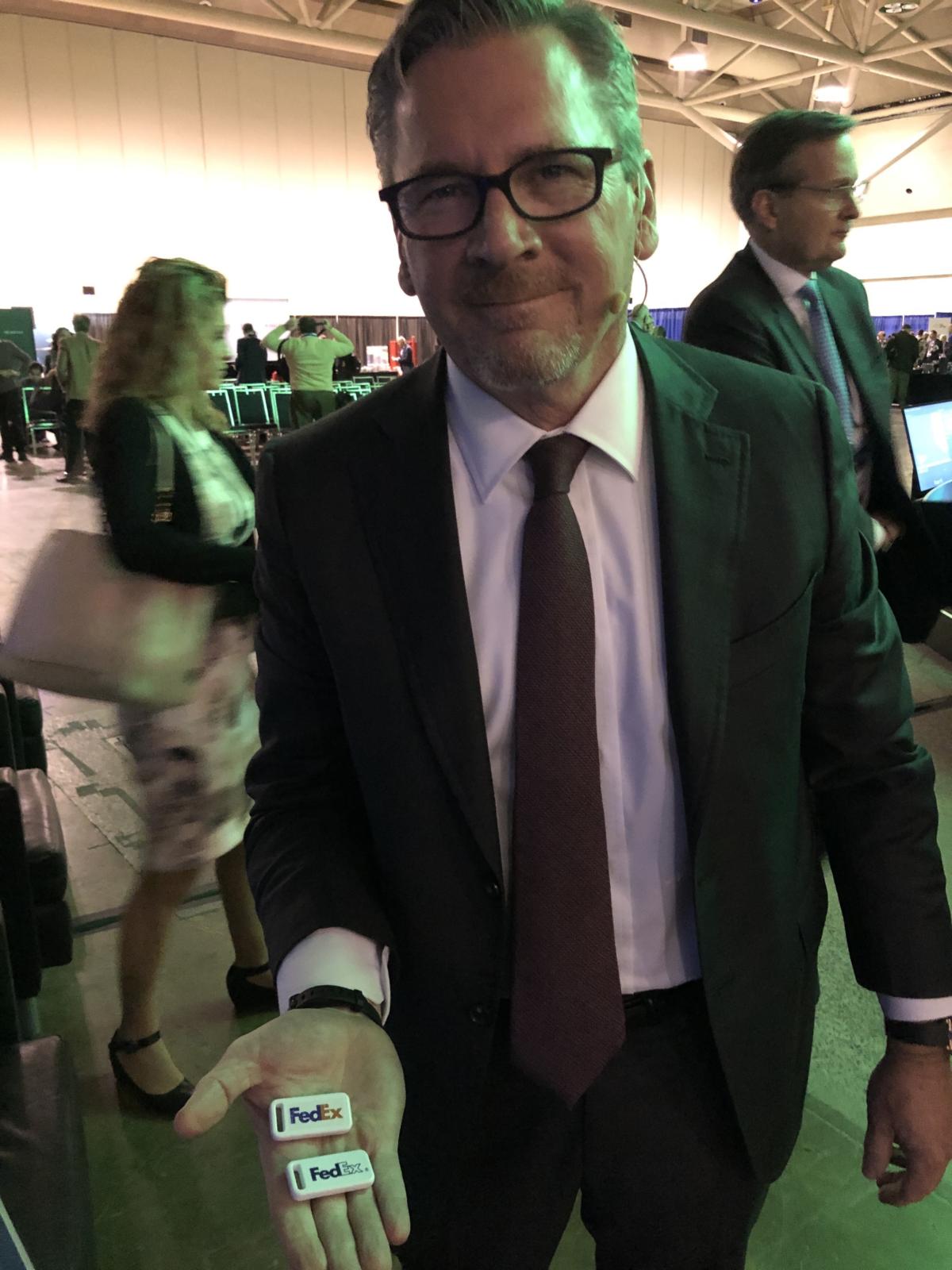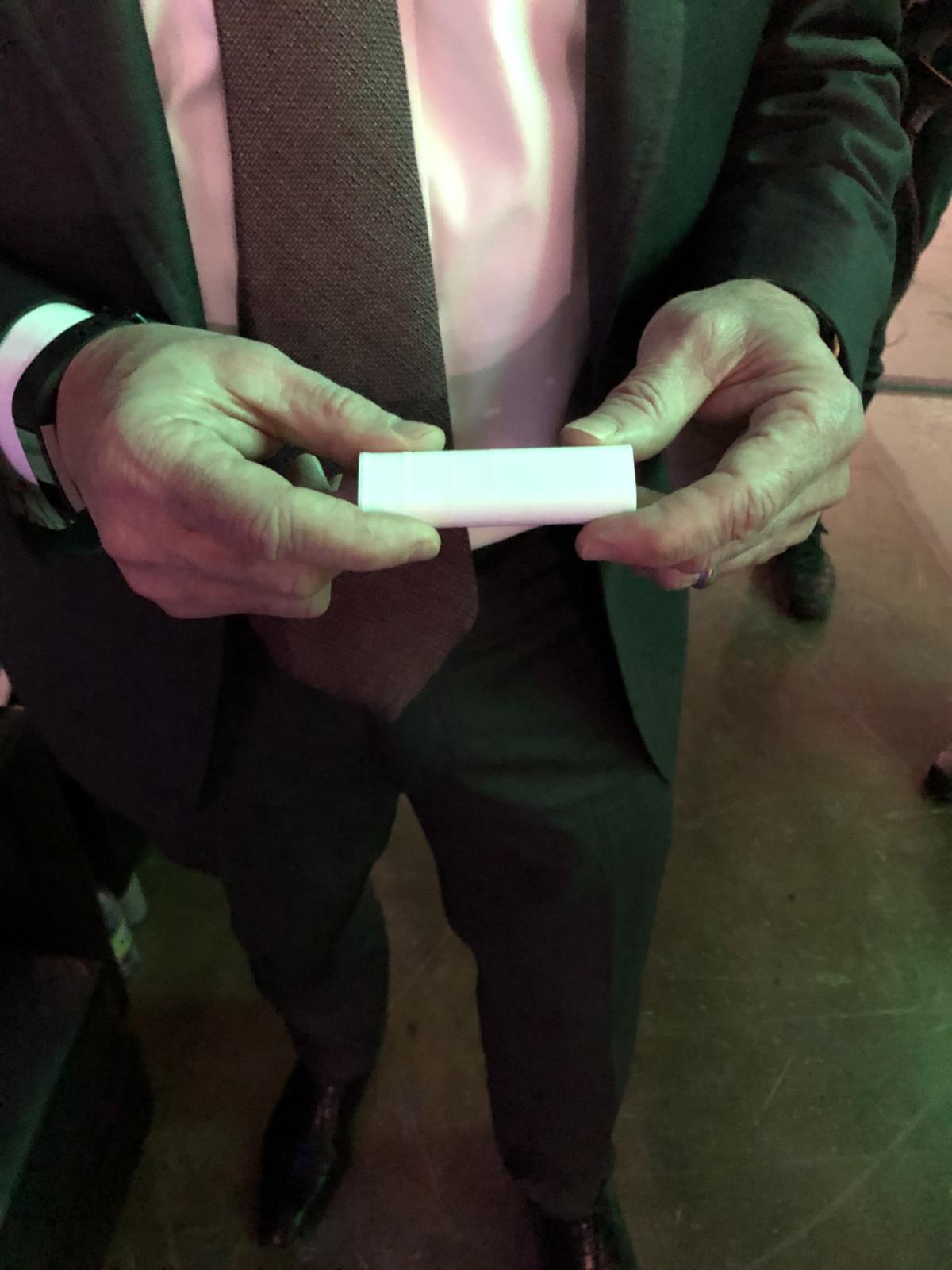Use Case: FedEx CIO: It’s time to mandate blockchain for international shipping | Computerworld
(computerworld.com)
With governments calling on manufacturers and shipping companies to more closely guard their chain of custody as parts and products move between borders, FedEx sees a single, standardized ledger as common sense.

By Lucas Mearian
Senior Reporter, Computerworld

IoT sensors that can be embedded in FedEx packages and record data, such as temperature, vibration levels and whether it has been opened.CURRENT JOB LISTINGS
TORONTO -- When railroad tracks were first laid across the western U.S., there were eight different gauges all competing to dominate the industry – making a nationwide, unified rail system impossible; it took an act of Congress in 1863 to force the adoption of an industry standard gauge of 4-ft., 8-1⁄2 inches.FedEx CIO Rob Carter believes the same kind of thing needs to happen for blockchain to achieve widespread enterprise adoption.
[ Further reading: Blockchain: The complete guide ]
While the promise of blockchain to create a more efficient, secure and open platform for ecommerce can be realized using a proprietary platform, it won't be a global solution for whole industries now hampered by a myriad of technical and regulatory hurdles.
Instead, a platform based on open-source software and industry standards will be needed to ensure process transparency and no one entity profits from the technology over others.


IDGA panel discussion about adopting blockchain standards for shipping companies. (Left to right: Don Tapscott, executive chairman of the Blockchain Research Institute; Dale Chrystie, business fellow and blockchain strategist for FedEx; Mahesh Sahasranaman, principal architect for UPS Supply Chain Solutions; and Eugene Laney, head of International Affairs for DHL Express USA.)
"I think we're in the state where we're duking it out for the dominant design," Carter said during a CIO panel discussion at the Blockchain Global Revolution Conference here. "We're not an organization that pushes for more regulatory control, but there are times regulatory mandates and pushes can be incredibly helpful.
"For example, Carter said, mandated blockchain standards would help customs and border agents create a chain of custody to better track the provenance of goods, enabling them to identify – and then block – the importation of things such as illegal drugs and counterfeit medical devices.
"There's an incredible amount of information moving with an international package," Carter said. "An incredible amount of paperwork [such as] certificates of origin, and certain commodities require specific licenses.
That information moves sometimes in digital forms and sometimes paper forms. As we move toward a more digital world, blockchain is where you piece all that together."Information about packages is as important, if not more so, as the packages themselves, Carter said.
Traditionally, the international shipping industry's information systems have used paper legal documents, and electronic data was transmitted via electronic data interchange (EDI) – a 60-year-old technology that doesn't present real-time information. Shipping participants have also shared documents via email, fax and courier.
FedEx has banded together with competitors – DHL Express and UPS -- to hammer out blockchain standards that could be deployed industrywide. All three shipping giants are part of the Blockchain in Transport Alliance (BiTA), an industry organization with more than 500 members.

IDGFedEx CIO Rob Carter displays two IoT sensors used to track packages and record ambient data about them.
"The three of us are looking at this globally," said Dale Chrystie, a FedEx business fellow and blockchain strategist.In January, FedEx's supply chain subsidiary, Trade Networks, rebranded itself as FedEx Logistics, reflecting the company's focus on meeting customers' increasingly complex cross-border shipping, transportation, value-added services and brokerage needs.
FedEx Logistics CEO Richard Smith pointed to a White House memorandum released earlier this month on the need to combat the trafficking of counterfeit and pirated goods.
An estimate from the Organization for Economic Co-operation and Development (OECD) put the value of trade in counterfeit and pirated goods at approximately half a trillion dollars annually, with roughly 20% of it infringing upon intellectual property belonging to U.S. entities.

BrandPost Sponsored by Huawei
Huawei Completes the World's First Commercial Verification of SuperBAND
Huawei has completed the first commercial verification of SuperBAND (phase 1) at its field in Asia Pacific. The result showed that the average download rate increased by more than 10%.
FedEx executives discussed how the company could address the issue with regulators, other carriers and retailers such as Amazon and Alibaba – and Smith said he pointed out the answer was staring them in the face: blockchain."It's what it does: authenticity," Smith said.
"So you want to know this merchandise is authentic and not counterfeit? Blockchain can do that. The concern from the government is that it hadn't been widely adopted. My response to that was, 'You're the government. You can mandate that it's widely adopted.
'"Why not plant a flag in the ground and say in the next five years all importers have to be up on blockchain? It's the only way you're going to be able to do it without slowing commerce to a crawl," Smith added.
Permissioned blockchains can create a transparent and immutable record of transactions, meaning every authorized entity on the ledger, whether public or government, can have the same information in real-time about the provenance of goods on a supply chain and where they are.
Smart contracts, a business automation tool, could enable the automatic processing of electronic documents once digital handshakes took place at borders.

IDGFedEx CIO Rob Carter displays an IoT sensor capable of transmitting package information to a blockchain ledger.FedEx and other shipping companies have also been speaking with healthcare customers about how to authenticate pharmaceuticals and medical devices, particularly as the industry moves toward 3D printing them.
FedEx has been conducting a proof of concept with "sensor-based logistics," using two types of IoT sensors about the size of a stick of gum that can track whether a package has been opened, its internal temperature and how much vibration it's experienced on its journey.
One of the two sensors can automatically transmit data to a blockchain ledger, according to Carter.Blockchain, however, is a team sport; no one company today completes customer supply chain shipments by itself, according to Eugene Laney, head of international government affairs for DHL Express.
For example, a company may use DHL Express to ship an automobile part to Germany to be assembled, and then use FedEx to convey the assembled part from Germany to another plant in Latin America. Then, yet a third shipper such as UPS brings the part to the U.S. for final assembly, Laney said.
"So how can we take all that information and share it amongst each other, and more importantly with four different governments?" Laney asked, emphasizing the need for an open and standardized version of blockchain to be shared by shipping participants.
DHL Express, Laney said, has mastered tracking and tracing single supply chain transactions.
But the system breaks down when DHL begins working with other shippers to get their customer's parts to a final destination. Along with other key elements, such as IoT and RFID tags attached to the packages, blockchain would improve visibility, not only for shippers but also for customers who could watch in real time as parts move through their manufacturing lifecycle.
"The key for me with standards is that they're agreed upon by a majority of participants..., so you can build applications around them," said Mahesh Sahasranaman, principal architect for UPS Supply Chain Solutions.FedEx, DHL Express and UPS each serve 220 countries, 90% of whom depend on taxes and duties for their revenue.
Those nations also need to know they're charging the correct taxes and duties on international shipments.Additionally, governments often ask manufacturers and their supply chain participants to ensure dangerous goods, such as counterfeit toys made with lead paint, can be detected and stopped.
In 2007, the U.S. and Chinese government asked importers to provide product designs to regulators to comply with U.S. safety standards, which has banned the use of lead paint since the 1970s.
The counterfeit toys continued to seep through borders. And in 2010, packages containing printer ink cartridges and explosive devices were discovered on FedEx and UPS flights from the Middle East.
Police were tipped off to the shipments, even as governments asked shipping companies to heighten their inspection of those types of packages."Blockchain would have helped us solve that," Laney said.

By Lucas Mearian
Senior Reporter, Computerworld

IoT sensors that can be embedded in FedEx packages and record data, such as temperature, vibration levels and whether it has been opened.CURRENT JOB LISTINGS
TORONTO -- When railroad tracks were first laid across the western U.S., there were eight different gauges all competing to dominate the industry – making a nationwide, unified rail system impossible; it took an act of Congress in 1863 to force the adoption of an industry standard gauge of 4-ft., 8-1⁄2 inches.FedEx CIO Rob Carter believes the same kind of thing needs to happen for blockchain to achieve widespread enterprise adoption.
[ Further reading: Blockchain: The complete guide ]
While the promise of blockchain to create a more efficient, secure and open platform for ecommerce can be realized using a proprietary platform, it won't be a global solution for whole industries now hampered by a myriad of technical and regulatory hurdles.
Instead, a platform based on open-source software and industry standards will be needed to ensure process transparency and no one entity profits from the technology over others.


IDGA panel discussion about adopting blockchain standards for shipping companies. (Left to right: Don Tapscott, executive chairman of the Blockchain Research Institute; Dale Chrystie, business fellow and blockchain strategist for FedEx; Mahesh Sahasranaman, principal architect for UPS Supply Chain Solutions; and Eugene Laney, head of International Affairs for DHL Express USA.)
"I think we're in the state where we're duking it out for the dominant design," Carter said during a CIO panel discussion at the Blockchain Global Revolution Conference here. "We're not an organization that pushes for more regulatory control, but there are times regulatory mandates and pushes can be incredibly helpful.
"For example, Carter said, mandated blockchain standards would help customs and border agents create a chain of custody to better track the provenance of goods, enabling them to identify – and then block – the importation of things such as illegal drugs and counterfeit medical devices.
"There's an incredible amount of information moving with an international package," Carter said. "An incredible amount of paperwork [such as] certificates of origin, and certain commodities require specific licenses.
That information moves sometimes in digital forms and sometimes paper forms. As we move toward a more digital world, blockchain is where you piece all that together."Information about packages is as important, if not more so, as the packages themselves, Carter said.
Traditionally, the international shipping industry's information systems have used paper legal documents, and electronic data was transmitted via electronic data interchange (EDI) – a 60-year-old technology that doesn't present real-time information. Shipping participants have also shared documents via email, fax and courier.
FedEx has banded together with competitors – DHL Express and UPS -- to hammer out blockchain standards that could be deployed industrywide. All three shipping giants are part of the Blockchain in Transport Alliance (BiTA), an industry organization with more than 500 members.

IDGFedEx CIO Rob Carter displays two IoT sensors used to track packages and record ambient data about them.
"The three of us are looking at this globally," said Dale Chrystie, a FedEx business fellow and blockchain strategist.In January, FedEx's supply chain subsidiary, Trade Networks, rebranded itself as FedEx Logistics, reflecting the company's focus on meeting customers' increasingly complex cross-border shipping, transportation, value-added services and brokerage needs.
FedEx Logistics CEO Richard Smith pointed to a White House memorandum released earlier this month on the need to combat the trafficking of counterfeit and pirated goods.
An estimate from the Organization for Economic Co-operation and Development (OECD) put the value of trade in counterfeit and pirated goods at approximately half a trillion dollars annually, with roughly 20% of it infringing upon intellectual property belonging to U.S. entities.

BrandPost Sponsored by Huawei
Huawei Completes the World's First Commercial Verification of SuperBAND
Huawei has completed the first commercial verification of SuperBAND (phase 1) at its field in Asia Pacific. The result showed that the average download rate increased by more than 10%.
FedEx executives discussed how the company could address the issue with regulators, other carriers and retailers such as Amazon and Alibaba – and Smith said he pointed out the answer was staring them in the face: blockchain."It's what it does: authenticity," Smith said.
"So you want to know this merchandise is authentic and not counterfeit? Blockchain can do that. The concern from the government is that it hadn't been widely adopted. My response to that was, 'You're the government. You can mandate that it's widely adopted.
'"Why not plant a flag in the ground and say in the next five years all importers have to be up on blockchain? It's the only way you're going to be able to do it without slowing commerce to a crawl," Smith added.
Permissioned blockchains can create a transparent and immutable record of transactions, meaning every authorized entity on the ledger, whether public or government, can have the same information in real-time about the provenance of goods on a supply chain and where they are.
Smart contracts, a business automation tool, could enable the automatic processing of electronic documents once digital handshakes took place at borders.

IDGFedEx CIO Rob Carter displays an IoT sensor capable of transmitting package information to a blockchain ledger.FedEx and other shipping companies have also been speaking with healthcare customers about how to authenticate pharmaceuticals and medical devices, particularly as the industry moves toward 3D printing them.
FedEx has been conducting a proof of concept with "sensor-based logistics," using two types of IoT sensors about the size of a stick of gum that can track whether a package has been opened, its internal temperature and how much vibration it's experienced on its journey.
One of the two sensors can automatically transmit data to a blockchain ledger, according to Carter.Blockchain, however, is a team sport; no one company today completes customer supply chain shipments by itself, according to Eugene Laney, head of international government affairs for DHL Express.
For example, a company may use DHL Express to ship an automobile part to Germany to be assembled, and then use FedEx to convey the assembled part from Germany to another plant in Latin America. Then, yet a third shipper such as UPS brings the part to the U.S. for final assembly, Laney said.
"So how can we take all that information and share it amongst each other, and more importantly with four different governments?" Laney asked, emphasizing the need for an open and standardized version of blockchain to be shared by shipping participants.
DHL Express, Laney said, has mastered tracking and tracing single supply chain transactions.
But the system breaks down when DHL begins working with other shippers to get their customer's parts to a final destination. Along with other key elements, such as IoT and RFID tags attached to the packages, blockchain would improve visibility, not only for shippers but also for customers who could watch in real time as parts move through their manufacturing lifecycle.
"The key for me with standards is that they're agreed upon by a majority of participants..., so you can build applications around them," said Mahesh Sahasranaman, principal architect for UPS Supply Chain Solutions.FedEx, DHL Express and UPS each serve 220 countries, 90% of whom depend on taxes and duties for their revenue.
Those nations also need to know they're charging the correct taxes and duties on international shipments.Additionally, governments often ask manufacturers and their supply chain participants to ensure dangerous goods, such as counterfeit toys made with lead paint, can be detected and stopped.
In 2007, the U.S. and Chinese government asked importers to provide product designs to regulators to comply with U.S. safety standards, which has banned the use of lead paint since the 1970s.
The counterfeit toys continued to seep through borders. And in 2010, packages containing printer ink cartridges and explosive devices were discovered on FedEx and UPS flights from the Middle East.
Police were tipped off to the shipments, even as governments asked shipping companies to heighten their inspection of those types of packages."Blockchain would have helped us solve that," Laney said.
-
- 1
Francisco Gimeno - BC Analyst Interesting: the issue now is not if the blockchain tech is a good tech for shipping and logistic use cases, but what type of platform, frame or standards should be used globally. This is a qualitative step.


